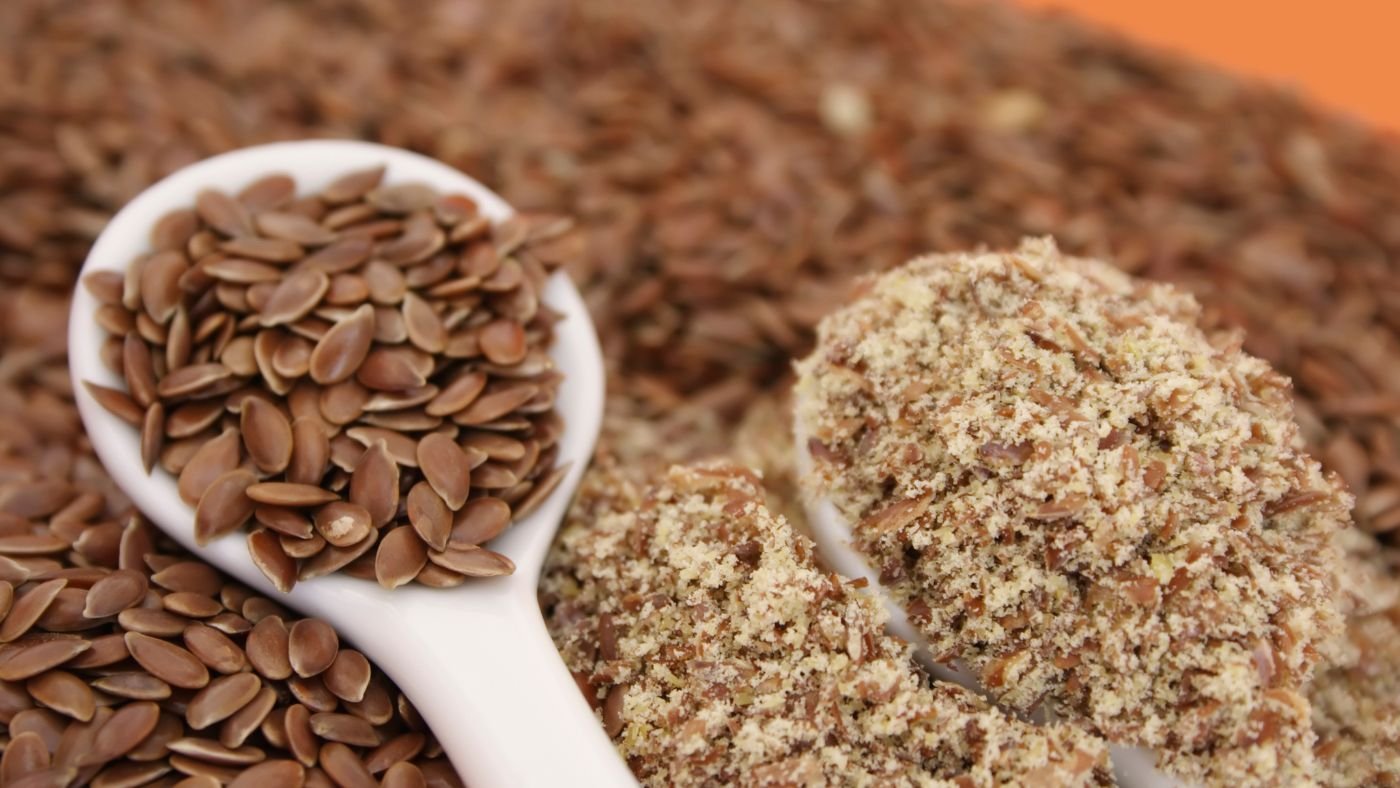Flaxseed is one of the oldest plants used by mankind. These small, dark brown seeds have a history dating back 6,000 years and are used all over the world. Despite this, flax seeds are quite invisible in the modern diet, many people do not even know how valuable this seed is.1
Flax seeds can be used in many ways: they can be ground into flour, pressed into oil, used as a plant-based egg substitute in vegan recipes, or simply eaten. In addition, due to its nutritional and healing properties, flaxseed is often classified as a "super food".
However, is flaxseed really a source of health in the modern diet? Do they have real health benefits and how should they be used? In this article, we will answer these questions and more.
Nutritional value of flax seeds
Flaxseed is a source of unique health enhancement that not only benefits our body but also our beauty. Each of these seeds contains many beneficial nutrients such as omega-3 fatty acids, proteins, vitamins and minerals.
In addition, flaxseeds are a good source of lignans, phytochemicals that have antioxidant and anti-estrogenic properties, which may reduce the risk of certain types of cancer. Flaxseed is also rich in flaxseed polyphenols, which can help fight inflammation and oxidative stress.
Flaxseeds are full of nutrients that help our bodies function optimally. Let's take a closer look:
Protein Source
Flaxseed contains about 26% of protein. They contain essential amino acids that the body cannot produce on its own. This means that these amino acids must be obtained through food.
Source of Good Fats
Flaxseed contains 40% of fat, most of which are polyunsaturated fatty acids, also known as "good" fats. These include omega-3, omega-6, monounsaturated fatty acids, stearic acid and palmitic acid.
Source of Vitamins and Minerals
Flaxseed contains many vitamins, including vitamin B1, which is important for metabolism and cell activity. They are also an excellent source of copper, which is important for brain development, immune health and iron metabolism
Thus, flaxseed is a rich source of nutrients. They are an excellent source of protein, fiber, omega-3 fatty acids, vitamin B1, manganese, magnesium and phosphorus. One tablespoon of flax seeds can provide about 37 calories, 1.3 grams of protein, 2 grams of fiber and 1.9 grams of omega-3 fatty acids.
Although flax seeds are nutritious, it is important to remember that they are quite high in calories and should be consumed in moderation. However, when used properly, they can be a great addition to a healthy diet.
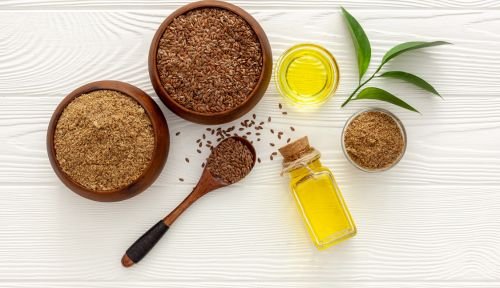
Interesting facts about flax seeds
Linseed and flax are one and the same plant. Flax is one of the oldest cultivated plants in the world and was used not only for food but also for fabric. In fact, the word "linen" (in Lithuanian - linas) comes from the ancient Greek word "linon", which means the flax plant.
Flaxseed is one of the richest sources of omega-3 fatty acids. They are particularly rich in alpha-linolenic acid (ALA), which is essential for the health of our bodies, but which we must obtain from food because our bodies cannot produce it.
In addition, flaxseed is one of the best sources of lignans. Lignans are phytoestrogens that may help regulate hormonal balance in women and reduce the risk of certain types of cancer.
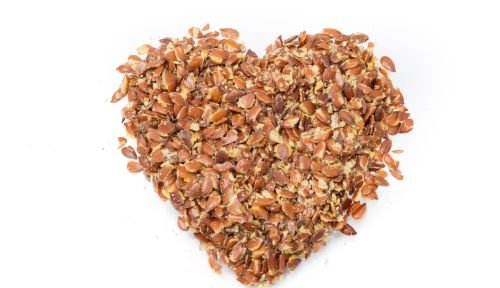
Health benefits of flax seeds
The health benefits of flaxseed are widely recognized. They can help reduce the risk of cardiovascular disease, improve digestion, reduce inflammation, control weight, and even help fight cancer.
The benefits for heart health are particularly significant. Because of their omega-3 fatty acids, flaxseeds can help lower blood pressure, reduce "bad" LDL cholesterol in the blood, and reduce the risk of heart disease.
Flaxseed is also a good source of fiber, which helps improve digestion. Fiber helps regulate bowel movements, reduces the risk of constipation, and can help control weight.
Additionally, flaxseeds contain antioxidants that help fight oxidative stress and inflammation caused by free radicals. It can help reduce the risk of many chronic diseases, including cancer and autoimmune diseases.
Flaxseed is known for its many health-enhancing properties that help our bodies function more efficiently and safely.
Heart Health
Flaxseed is an excellent source of alpha linolenic acid, which belongs to the group of omega-3 fatty acids. This fatty acid has a positive effect on the health of our cardiovascular system by reducing inflammation and preventing cholesterol from building up in the blood vessels of the heart.
Cancer Prevention
Flaxseed also contains plant-derived compounds called lignans, which are known for their cancer-fighting properties. Studies show that consuming flaxseed can reduce the risk of breast cancer, especially in postmenopausal women.
Digestive Health
Thanks to their fiber content, flaxseeds can also have a positive effect on our digestive system. They can help regulate blood sugar, lower cholesterol, and prevent constipation.

The role of flax seeds in modern nutrition
Flaxseed is an excellent supplement in the modern diet. Because of their nutritional value and health benefits, they can help improve our overall health and well-being.
Flaxseeds are versatile and can be used as an ingredient in a variety of dishes including soups, salads, smoothies, baked goods and much more. They can also be used as a healthy snack between meals or as a supplement to a healthy breakfast dish such as oatmeal or yogurt.
Flaxseeds can also benefit vegans and vegetarians as they are a good source of protein and omega-3 fatty acids. Additionally, flaxseed can be used as a vegetable substitute for eggs in vegan recipes.
How flax seeds are good for the intestines
Flaxseed is very beneficial for gut health. The fiber they contain helps to regulate intestinal activity, reduces the risk of constipation and can help fight the "irritable bowel" syndrome.
The fiber we get from flaxseed contains prebiotics, substances that feed gut bacteria and help them grow. This process helps maintain a healthy gut microflora, which is essential to our overall health.
In addition, flaxseeds contain lignans, which can also improve gut health. Research shows that lignans can help fight bowel cancer.
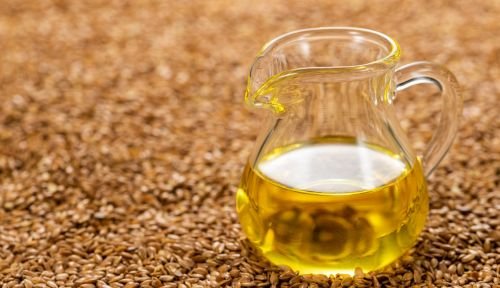
How to use flaxseed correctly in your diet
In order to get the maximum benefit from flaxseed, it is important to know how to use it correctly. First, flaxseed should be ground before consumption. Whole flaxseeds can pass through the intestines intact, so it is important to grind them to absorb the nutrients they contain.
Flaxseed can be used in a variety of dishes, including oatmeal, smoothies, soups, salads and baked goods. They can also be used as a healthy snack between meals.
Although flax seeds are highly nutritious, they are quite high in calories and should be consumed in moderation. A good dose is about 1-2 tablespoons of ground flaxseed per day.
Flaxseed recipes for a healthy diet
Flaxseed can be used in many recipes to increase the nutritional value of your diet. Here are some ideas on how you can use flaxseed:
Recipe for oatmeal with flax seeds
- 1/2 cup oatmeal
- 1 tablespoon of ground flaxseed
- 1 tablespoon of honey or other sweetener
- 1 cup milk or vegetable milk
- Fruits and nuts to taste
Put the oatmeal, flaxseed and milk in a saucepan and cook over low heat until the oatmeal is soft. Add honey and fruits and nuts of your choice. Enjoy a healthy and nutritious breakfast!
Flax seed and banana cocktail
- 1 banana
- 1 tablespoon of ground flaxseed
- 1 cup plant-based milk
- 1 tablespoon of honey or other sweetener
- Ice cubes to taste
Mix all the ingredients in a blender until you get a smooth cocktail. It's a great way to start the day or refresh after a workout.
Flax seed and avocado salad
- 1 avocado
- 1 tablespoon of ground flaxseed
- 1 tablespoon of olive oil
- 1 tablespoon of lemon juice
- Salt and pepper to taste
Cut the avocado, add flax seeds, cover with olive oil and lemon juice, sprinkle with salt and pepper. This is a healthy and delicious lunch.

Research on the benefits of flax seeds
Many scientific studies support the health benefits of flax seeds. For example, in 2010 A meta-analysis that included 28 clinical trials found that flaxseed consumption was associated with lower levels of systolic and diastolic blood pressure.
Another 2013 A study found that taking flaxseed can help reduce menopausal symptoms. Women who consumed 40 grams of flaxseed per day for 6 months experienced re
Scientists have been researching the benefits of flaxseed and its role as a source of health for years. Their research shows that flaxseed can help reduce the risk of heart disease, regulate blood cholesterol, improve digestion and even reduce the risk of cancer.
There are many studies that show that flaxseed can help reduce the risk of heart disease. They can help lower blood pressure, lower "bad" cholesterol levels in the blood, and increase "good" cholesterol levels. In addition, flaxseeds are a good source of omega-3 fatty acids, which are important for heart health.
Flaxseed can also help regulate bowel movements. They are a good source of fiber, which can help regulate intestinal peristalsis and prevent constipation. In addition, flaxseed can help reduce inflammation in the gut and improve digestion.
When to Avoid Flaxseeds?
Although flaxseed is a source of many health benefits, there are some cases where its consumption can cause negative effects. If you have an allergy to flaxseed or flaxseed oil, you should avoid them. Also, flaxseed can interact with several medications, so you should consult your doctor before taking it.
Flaxseed is a great natural source of many health benefits. Using them in your diet can help improve heart health, control weight, strengthen your digestive system, and even help fight cancer. Although flaxseed is safe for most people to consume, it is still recommended that you consult your doctor before taking it, especially if you are taking any medications or have health problems.
Where to buy and how to store flax seeds
Flaxseed is readily available and can be purchased at most grocery stores, health food stores, or online. They can be purchased as whole seeds or already ground. It is important to note that ground flaxseed has a shorter shelf life as it can oxidize quickly.
The key to storing flaxseed is to store it in a tightly closed container and in a dry, cool place. This will help prevent them from oxidizing and ensure they stay fresh longer. In addition, it is recommended to consume flax seeds within a few months after purchase to prevent oxidation of their fats.
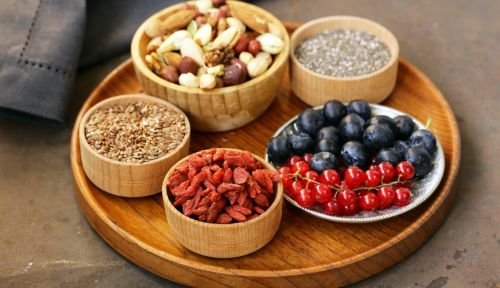
Use of Flax Seeds
Flaxseed is a versatile tool that can be used in a variety of dishes. They can be mixed into a morning cocktail, added to pancake batter or cocktails. They're also great for granola, bread, cake, and even ground flaxseed in smoothies, yogurt, or just with water.
Frequently asked questions about flaxseed
What are flax seeds?
Flaxseeds are small, nutty seeds that come from the flax plant. They are known for their health benefits and are rich in omega-3 fatty acids, fiber and lignans.
What are the uses of flaxseed?
Flaxseeds can be used in many ways: sprinkled on porridge, mixed into yogurt, baked goods or salads, and can also be used to make flaxseed oil.
Do Flaxseeds Have Health Benefits?
Yes, flaxseed is good for health. They help regulate cholesterol levels, improve heart health, reduce inflammation, and can help control blood sugar levels.
Are there any side effects of taking flaxseed?
Flaxseed is generally safe, but consuming large amounts can cause indigestion. It is also important to take them with enough water.
How to store flax seeds?
Flaxseed should be stored in an airtight container in a cool, dry place. Ground flaxseed can be stored in the refrigerator to preserve freshness.
How much flaxseed should I eat a day?
A good dose is about 1-2 tablespoons of ground flaxseed per day.
Can flaxseed cause an allergic reaction?
Flaxseed is safe for most people, but can cause an allergic reaction in some. If you experience any sign of allergy (eg, rash, hives, vomiting), you should stop taking flaxseed and consult your doctor.
Can I eat flax seeds during pregnancy?
Flaxseed is safe during pregnancy, but you should always consult your doctor before taking any supplement.

Conclusion: Are flax seeds really a source of health in the modern diet?
Considering all the scientific research and the benefits of flaxseed, it can be said that they are truly a source of health in the modern diet. Not only can they help regulate bowel movements, reduce the risk of heart disease and improve skin condition, but they are also a rich source of protein, fiber and omega-3 fatty acids.
Flaxseed can easily be incorporated into your daily diet and used in a variety of ways. They can be ground up and added to yogurt, bars, pancakes or baked goods, or used as an egg substitute in vegan recipes.
So, if you are looking for a healthy, natural and easily available dietary supplement, flaxseed can be a great choice. Not only will they help you reach your health goals, but they will also enrich your diet with important nutritional components.
